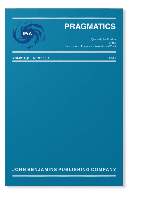
Pragmatics
Scope & Guideline
Unlocking the complexities of human interaction.
Introduction
Aims and Scopes
- Corpus Linguistics:
Utilizes large collections of texts (corpora) to analyze language patterns, usage, and variations across different contexts and speaker groups. - Pragmatic Analysis:
Explores how context influences the interpretation of meaning, including the analysis of speech acts, politeness strategies, and discourse markers. - Intercultural Communication:
Investigates how language use varies across cultures, contributing to the understanding of cross-cultural pragmatics and communicative competence. - Digital Communication:
Examines language use in online contexts, focusing on social media, digital discourse, and the implications for identity and community. - Historical and Sociolinguistic Perspectives:
Analyzes language change and variation over time, providing insights into the evolution of discourse practices and their social implications.
Trending and Emerging
- Multimodal Pragmatics:
There is a growing interest in how different modes of communication (e.g., visual, auditory) interact with verbal language, particularly in digital and face-to-face interactions. - Corpus-Based Pragmatic Studies:
An increasing number of studies utilize corpus-based methodologies to explore pragmatic phenomena, demonstrating the impact of large datasets on understanding language use. - Pragmatics of Social Media:
Research focusing on language use in social media platforms is on the rise, reflecting the importance of digital communication in contemporary society. - Contextualized Language Learning:
Emerging studies emphasize the role of pragmatics in language education, particularly regarding the teaching of pragmatic competence to learners in diverse contexts. - Identity and Pragmatic Variation:
There is an increased focus on how language use reflects and constructs identity, particularly in multicultural and multilingual settings.
Declining or Waning
- Traditional Speech Act Theory:
There is a noticeable reduction in studies focused solely on classical speech act theory, as newer research tends to integrate these concepts within broader pragmatic frameworks. - Static Models of Politeness:
Research on fixed models of politeness strategies is appearing less frequently, possibly due to the growing recognition of dynamic and context-sensitive approaches to politeness. - Discourse Analysis in Isolation:
Studies that approach discourse analysis without incorporating corpus methods are less common, indicating a shift towards more empirical, data-driven research. - Linguistic Universals in Pragmatics:
Explorations of universal principles governing pragmatic behavior are becoming less frequent, as the field increasingly emphasizes the diversity of pragmatic practices across cultures.
Similar Journals

Journal of Greek Linguistics
Exploring the Depths of Greek Language and CultureThe Journal of Greek Linguistics, published by BRILL, is a premier platform dedicated to advancing the study of Greek language and its historical and contemporary implications within the broader field of linguistics. With an impact factor recognized in the linguistics community, this journal significantly contributes to the academic discourse surrounding Greek linguistics and its relevance in cultural and social studies. First made open access in 2016, it is now accessible to a global audience, facilitating a collaborative environment for researchers, scholars, professionals, and students alike. The journal is proudly positioned in the Q2 quartile for linguistics and language, reflecting its esteemed standing in the academic community, and it ranks within the top 30% in both the Arts and Humanities and Social Sciences categories according to Scopus. With a focus on the intersection of language, culture, and society, the journal invites contributions that offer new insights and promote interdisciplinary research. The Journal of Greek Linguistics continues to be an essential resource for those engaged in the rich and evolving conversation about the Greek language.
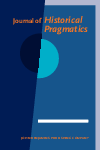
Journal of Historical Pragmatics
Illuminating the Sociocultural Dimensions of LanguageJournal of Historical Pragmatics, published by JOHN BENJAMINS PUBLISHING CO, stands as a pivotal platform in the field of linguistics, focusing on the intersection of language, history, and pragmatics. With its ISSN 1566-5852 and E-ISSN 1569-9854, this esteemed journal has been curating scholarly discussions since 2000, with a converged publication timeline extending to 2024. Acknowledged for its academic rigor, it holds a commendable Q2 category ranking in the Linguistics and Language domain and features impressive Scopus rankings, being placed at #202 out of 1088 in Arts and Humanities and at #237 out of 1167 in Social Sciences. The journal is instrumental in advancing our understanding of historical language use and its sociocultural ramifications, offering researchers, professionals, and students a rich repository of articles that contribute to both theoretical and practical applications in historical linguistics and pragmatics. By fostering interdisciplinary dialogue and promoting innovative methodologies, Journal of Historical Pragmatics not only enriches scholarly literature but also strengthens the global academic community in uncovering the complexities of language through time.
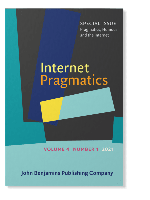
Internet Pragmatics
Unveiling the Nuances of Online InteractionInternet Pragmatics, published by John Benjamins Publishing Company, stands as an essential journal within the fields of Computer Networks and Communications and Linguistics and Language. With an ISSN of 2542-3851 and an E-ISSN of 2542-386X, it has been dedicated to exploring the nuanced interactions and societal implications enabled by the internet since its inception in 2019. The journal has quickly gained a strong academic reputation, achieving a Q3 ranking in its Computer Networks and Communications category and a prestigious Q1 ranking in Linguistics and Language for 2023, showcasing its vital contribution to interdisciplinary discourse. Researchers and professionals alike can benefit from its robust collection of articles that delve into the intersection of technology and communication, making it a pivotal resource for those keen on understanding the evolving landscape of digital interaction. Although currently available through traditional access options, the journal endeavors to broaden access, ensuring that valuable insights in this rapidly advancing field reach a wider audience.

Voprosy Yazykoznaniya
Advancing the Frontiers of Language ResearchVoprosy Yazykoznaniya, published by the esteemed Russian Academy of Sciences and the State Academy of Humanities (GAUGN), stands as a leading journal in the field of linguistics and language studies. With an impressive Q2 rank in Linguistics and Language for 2023 and a strong position within Scopus rankings, this journal fosters scholarly dialogue and pushes the boundaries of linguistic research by providing a platform for innovative studies, reviews, and analyses. Although not open access, its publication ensures high academic standards and visibility within the global academic community. Researchers, professionals, and students alike can benefit from the rich insights and diverse perspectives presented in this journal, serving as a vital resource for anyone interested in the intricacies of language and its role in society. Operating since 2009 and continuing to 2024, Voprosy Yazykoznaniya is an essential reference point for contemporary linguistic scholarship in the Russian Federation and beyond.
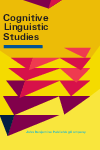
Cognitive Linguistic Studies
Pioneering Research at the Intersection of Language and CognitionCognitive Linguistic Studies is a prestigious journal published by JOHN BENJAMINS PUBLISHING CO, dedicated to advancing the interdisciplinary field of cognitive linguistics. With an ISSN of 2213-8722 and an E-ISSN of 2213-8730, the journal serves as an essential platform for the dissemination of high-quality research that delves into the intricate relationships between language, thought, and cultural contexts. Located in the vibrant academic milieu of the Netherlands, this journal has gained recognition for its impactful contributions, reflected in its respectable Q2 category ranking within the field of Linguistics and Language as of 2023. Redesigned to accommodate a broader audience, the journal welcomes original research articles, reviews, and theoretical discussions that bridge cognitive science and linguistic inquiry. As the journal continues its trajectory of growth, being indexed with a solid Scopus rank of #459 out of 1167 in the social sciences, it remains a vital resource for researchers, professionals, and students eager to explore the dynamic interplay between cognition and language.

Cultura Lenguaje y Representacion-Revista de Estudios Culturales de la Universitat Jaume I
Bridging Disciplines Through Cultural ExplorationCultura Lenguaje y Representacion - Revista de Estudios Culturales de la Universitat Jaume I is a premier open-access journal dedicated to the exploration of cultural studies, linguistic discourse, and literary theory, published by the esteemed Universitat Jaume I. Since its inception in 2004, the journal has consistently aimed to provide a vibrant platform for interdisciplinary research and critical reflection within the fields of communication, literature, and cultural representation. With its impressive rankings in the Scopus database—placing in the 93rd percentile for Literature and Literary Theory and the 73rd percentile for Cultural Studies—this journal is recognized for its impactful contributions to academic discussions. Operated out of Castelló de la Plana, Spain, the publication not only welcomes contributions from seasoned scholars but also encourages emerging researchers to submit innovative works. By maintaining a dedication to accessibility and quality, Cultura Lenguaje y Representacion positions itself as an essential resource for scholars, practitioners, and students seeking to deepen their understanding of the intricate relationship between culture, language, and representation.
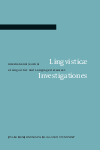
Linguisticae Investigationes
Fostering innovation in language studies since 1977.Linguisticae Investigationes is a prestigious academic journal published by John Benjamins Publishing Co, dedicated to advancing the field of linguistics and language studies. Established in 1977 and reflecting a rich history of scholarly contributions, this journal has persisted through significant disciplinary developments and continues to publish original research, articles, and reviews that explore the intricate facets of language. With an ISSN of 0378-4169 and an E-ISSN of 1569-9927, the journal is indexed in Scopus, currently ranking in the 31st percentile within the linguistics and language category, demonstrating its solid impact in the field despite its Q3 quartile classification. The peer-reviewed articles aim to foster collaboration and innovation among linguists, providing a platform for researchers, professionals, and students to explore emerging theories and methodologies. Although currently not an Open Access journal, it remains an essential resource for anyone passionate about the nuances of language and its study, reinforcing its role as a cornerstone for dialogue in contemporary linguistics.
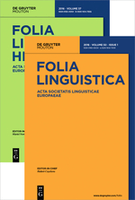
FOLIA LINGUISTICA
Connecting Scholars Through Language DiscoveryFOLIA LINGUISTICA, published by WALTER DE GRUYTER GMBH, is a premier scholarly journal dedicated to the field of linguistics. Established in 1967, the journal has consistently provided a platform for innovative research and scholarly discourse in language and linguistics, contributing significantly to the academic community's understanding of language structures, usage, and cognitive processes. With its classification in the top quartile (Q1) of linguistics and language in 2023, FOLIA LINGUISTICA holds a respectable rank (#282/1088) within the Arts and Humanities category and an admirable percentile rank of 74th, ensuring its position at the forefront of linguistic scholarship. Researchers and academics from around the globe can access a wealth of knowledge and cutting-edge research findings through this esteemed publication, which is vital for anyone looking to engage with the latest advancements in linguistics. Located in Berlin, Germany, FOLIA LINGUISTICA encompasses all aspects of language research, making it an indispensable resource for researchers, professionals, and students alike seeking to deepen their understanding of language and its complexities.
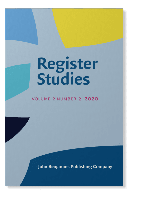
Register Studies
Unveiling Linguistic Diversity Across ContextsRegister Studies is an innovative and vital journal dedicated to the exploration of linguistic registers and variability in language use across diverse contexts. Published by John Benjamins Publishing Co, this journal serves as an essential resource for researchers and professionals in the fields of linguistics, sociolinguistics, and communication studies. With its emphasis on empirical research and theoretical advancements, Register Studies aims to uncover the nuances of language in social interaction, providing a platform for high-quality scholarly work. Although specific accessibility options are not outlined, the journal adheres to rigorous academic standards and strives to contribute significantly to the understanding of language's role in society. By fostering an interdisciplinary dialogue, Register Studies equips students, researchers, and educators with the insights necessary to navigate and contribute to the ever-evolving landscape of language studies.

Iberica
Democratizing access to cutting-edge linguistic research.Iberica, an esteemed journal published by AELFE, serves as a vital platform for scholarly discourse in the fields of linguistics and language studies. With its inception as an Open Access publication in 1999, Iberica has democratized access to high-quality research, fostering an environment of collaboration and innovation among researchers and professionals alike. Based in Spain at UNIV JAUME I, the journal has witnessed a remarkable ascent in the 2023 category quartiles, achieving a Q1 ranking in Linguistics and Language. Furthermore, its impressive Scopus rankings place it in the top 25% within both the Arts and Humanities and Social Sciences disciplines. Covering a diverse range of topics from theoretical linguistics to applied language studies, Iberica offers a compelling opportunity for academics seeking to contribute to and engage with contemporary issues in the linguistic landscape. As it converges in its publishing years from 2008 to 2024, it continues to set the standard for excellence within its field, making it an essential resource for students, researchers, and language professionals.